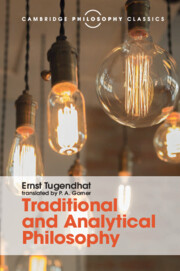Book contents
- Frontmatter
- Dedication
- Contents
- Preface
- Preface
- Translator's preface
- Part I Introduction: confrontation of analytical philosophy with traditional conceptions of philosophy
- Part II A first step: analysis of the predicative sentence
- 8 Preliminary reflections on method and preview of the course of the investigation
- 9 Husserl's theory of meaning
- 10 Collapse of the traditional theory of meaning
- 11 Predicates: the first step in the development of an analytical conception of the meaning of sentences. The dispute between nominalists and conceptualists
- 12 The basic principle of analytical philosophy. The dispute continued. Predicates and quasi-predicates
- 13 The meaning of an expression and the circumstances of its use. Dispute with a behaviouristic conception
- 14 The employment-rule of an assertoric sentence. Argument with Grice and Searle
- 15 Positive account of the employment-rule of assertoric sentences in terms of the truth-relation
- 16 Supplements
- 17 ‘And’ and ‘or’
- 18 General sentences. Resumption of the problem of predicates
- 19 The mode of employment of predicates. Transition to singular terms
- 20 What is it for a sign to stand for an object? The traditional account
- 21 The function of singular terms
- 22 Russell and Strawson
- 23 What is ‘identification’?
- 24 Specification and identification. Specification and truth
- 25 Spatio-temporal identification and the constitution of the object-relation
- 26 Supplements
- 27 Results
- 28 The next steps
- Bibliography
- Index of names
- Index of subjects
10 - Collapse of the traditional theory of meaning
from Part II - A first step: analysis of the predicative sentence
Published online by Cambridge University Press: 05 August 2016
- Frontmatter
- Dedication
- Contents
- Preface
- Preface
- Translator's preface
- Part I Introduction: confrontation of analytical philosophy with traditional conceptions of philosophy
- Part II A first step: analysis of the predicative sentence
- 8 Preliminary reflections on method and preview of the course of the investigation
- 9 Husserl's theory of meaning
- 10 Collapse of the traditional theory of meaning
- 11 Predicates: the first step in the development of an analytical conception of the meaning of sentences. The dispute between nominalists and conceptualists
- 12 The basic principle of analytical philosophy. The dispute continued. Predicates and quasi-predicates
- 13 The meaning of an expression and the circumstances of its use. Dispute with a behaviouristic conception
- 14 The employment-rule of an assertoric sentence. Argument with Grice and Searle
- 15 Positive account of the employment-rule of assertoric sentences in terms of the truth-relation
- 16 Supplements
- 17 ‘And’ and ‘or’
- 18 General sentences. Resumption of the problem of predicates
- 19 The mode of employment of predicates. Transition to singular terms
- 20 What is it for a sign to stand for an object? The traditional account
- 21 The function of singular terms
- 22 Russell and Strawson
- 23 What is ‘identification’?
- 24 Specification and identification. Specification and truth
- 25 Spatio-temporal identification and the constitution of the object-relation
- 26 Supplements
- 27 Results
- 28 The next steps
- Bibliography
- Index of names
- Index of subjects
Summary
The guiding question of our investigation is: What is it to understand a sentence? This question I regard as the fundamental question of philosophy, which should take the place of the traditional fundamental question – what is being as being? or what is it to represent an object? We are thus not asking this question for the sake of asking it but rather with the aim of reaching a new philosophical approach. The conviction expressed in the first part of these lectures that the question – What is it to understand a sentence? – has the formal universality of the question concerning objects as objects and in fact is more comprehensive than the latter, does not amount to a new approach vis-à-vis the object-orientated approach; it merely points in the direction of such a new approach. One can only develop it by working out a new basic conceptuality appropriate to the new subject-matter. To achieve this we shall first look at what happens when the traditional basic conceptuality is applied to the understanding of a sentence, in the expectation that the resulting tension will yield a basis for the development of a new horizon of explanation.
In the last lecture we were able to see how the object-orientated approach did not prevent Husserl from giving a plausible account of the distinction between the meaning and the object of names but that in the case of the meaning of whole sentences it lands him in grave difficulties. The state of affairs that p, which Husserl himself initially interprets as a subsequent modification, must, given the object-orientated approach, be projected back into the original consciousness of the meaning of ‘p’. Accordingly, if the consciousness of a state of affairs cannot be elucidated by reference to the understanding of a sentence, but the understanding of the expression composed of singular term and predicate is an originally objectual consciousness, then the manner in which the meaning of the predicative sentence depends on the meaning of its terms can only be explained by means of the only object-orientated conceptuality available for this purpose, i.e. it must be construed as composition, as synthesis.
- Type
- Chapter
- Information
- Traditional and Analytical PhilosophyLectures on the Philosophy of Language, pp. 128 - 139Publisher: Cambridge University PressPrint publication year: 2016

